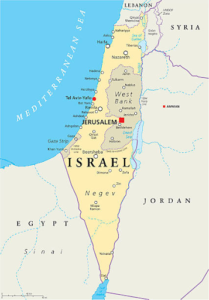In news- Israel and India celebrated 30 years of establishment of diplomatic relations recently.
Key updates-
- As part of the celebrations, the Teen Murti Haifa Chowk in the national capital lit up in Indian and Israeli colours to celebrate 30 years of friendship between India and Israel.
- Earlier known as Teen Murti chowk, it was renamed as Teen Murti Haifa Chowk in January 2018 during the former Israeli Prime Minister Benjamin Netanyahu visit to India.
- The three bronze statues at Teen Murti represent the Hyderabad, Jodhpur and Mysore Lancers, who were part of the 15 Imperial Service Cavalry Brigade, which carried out the victorious assault on the fortified Israeli city of Haifa on September 23, 1918, during World War I.
About India-Israel relations-
- Though India had recognised Israel on September 17, 1950, full-fledged diplomatic relations between the countries were established on January 29, 1992.
- Israel opened its embassy in Delhi on February 1, 1992 and the Indian Embassy in Tel Aviv opened on May 15 the same year.
- India is the largest buyer of Israeli military equipment and Israel is the second-largest supplier of military equipment to India after Russia.
- Military and strategic ties between the two nations extend to intelligence-sharing on terrorist groups and joint military training.
- As of 2014, India is the third-largest Asian trade partner of Israel, and its tenth-largest trade partner overall; bilateral trade, excluding military sales, stood at $4.52 billion.
- Modi’s famous visit in 2017 was the first by an Indian Prime Minister, and with that, relations further expanded with India abstaining from voting against Israel in several United Nations resolutions.
About Israel-
- It is a country in Western Asia, situated on the southeastern shore of the Mediterranean Sea and the northern shore of the Red Sea.
- It shares borders with Lebanon to the north, Syria to the northeast, Jordan to the east, and Egypt to the southwest; it is also bordered by the Palestinian territories of the West Bank and the Gaza Strip to the east and west, respectively.
- Tel Aviv is the economic and technological center of the country, while its seat of government is in its proclaimed capital of Jerusalem, although international recognition of Israeli sovereignty over the city is limited.

- Following World War I, Britain controlled the entirety of the territory of what makes up Israel, the Palestinian territories, and Jordan as a League of Nations mandate.
- After World War II, the newly formed United Nations adopted the Partition Plan for Palestine in 1947, recommending the creation of independent Arab and Jewish states, and an internationalized Jerusalem.
- The plan was accepted by the Jewish Agency but rejected by Arab leaders.
- Following a civil war within Mandatory Palestine between Yishuv forces and Palestinian Arab forces, Israel declared independence at the termination of the British Mandate.
- The war internationalized into the 1948 Arab–Israeli War between Israel and several surrounding Arab states and concluded with the 1949 Armistice Agreements that saw Israel in control of most of the former mandate territory, while the West Bank and Gaza were held by Jordan and Egypt respectively.
- Israel has since fought several wars with Arab countries, and since the Six-Day War in June 1967 has occupied several territories, and continues to occupy the Golan Heights and the Palestinian territories of the West Bank, including East Jerusalem, and the Gaza Strip, which is disputed.
Source: The Indian Express














